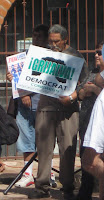Sheriff Joe Arpaio of Maricopa County, “the toughest sheriff in the world,” promotes the idea that all undocumented immigrants are criminals. He brags about the his raids and the many criminals he catches on his raids and crime sweep stops. Sheriff Arpaio sends his troop to Latino neighborhoods and has his officers pull over Latinos for any chance they got. Are all of the undocumented Latinos that he catches criminals? The majority aren’t. This past week at work, I analyzed data of Sheriff Arpaio’s crime sweep stops that was published in a Phoenix newspaper. Out of 392 crime sweep stops, the most frequent way that people were caught were for being passengers in a car that was pulled over. When a cop pulls over the car, they only have the right to question the driver. Even then, they do not have the right to ask the driver, or any passenger, their immigration status. These 63 passengers that Arpaio’s troops caught were caught because the officers violated the law in asking them their status and the individuals did not know their rights and responded. The most frequent reason for being stopped was having a cracked windshield (46 of 392) and the next was speeding (43 of 392), not criminal speeding. The rest of the probable causes for being stopped were petty things such as having a headlight or a tail light out, expired registration, unreadable license plate, running a stop sign, etc. Contrastingly, there was one open container, one subject with a gun, two criminal littering, two domestic fighting, four criminal speeding and fourteen unspecified warrants. Certainly, the latter are crimes but they hardly make up the majority of the causes for being stopped. United States citizens commit crimes as well. As a matter of fact, due to Sheriff Arpaio’s obsession with tracking down undocumented immigrants, there are 38,000 warrants that haven’t been served in Maricopa County. With SB1070 allowing any Arizona resident to sue if he/she believes that an officer or agency isn’t making enough of an effort to impose or is impeding Federal Immigration Laws, it is quite possible that other police forces throughout the state will become focused on undocumented immigrants as Sheriff Arpaio’s troops. Is it really in our best interest or safety to have police troops tracking down cracked windshields or no headlights rather than go after actual criminals?











